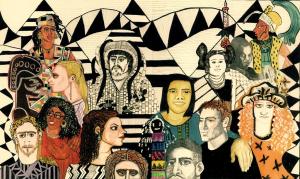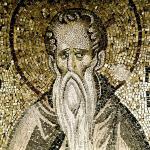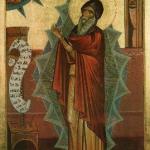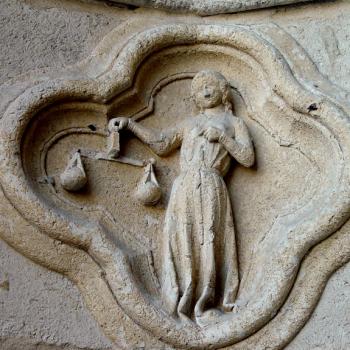
We can learn about God by examining creation, and discerning within it the way God engages creation, that is, through our apprehension of the uncreated energies of God, we know there is a divine creator at work, even as we can apprehend various qualities about God because through the energies we learn how God works in and with creation itself. Similarly, we can learn something about God through the way created being can and does imagine God. Both of these show us how and why we can apprehend something about the qualities of God. For, not just through the uncreated energies, but also by the way created being imagines God, we can discern qualities about God, so long as we realize that when we use creation in this fashion, we do so by analogy, with all the limitations involved with their use:
Paul the apostle teaches us that the invisible things of God are understood by means of things that are visible, and that the things that are not seen are beheld through their relationship and likeness to things seen. He thus shows that this visible world teaches us about that which is invisible, and that this earthly scene contains certain patterns of things heavenly. Thus it is to be possible for us to mount up from things below to things above, and to perceive and understand from the things we see on earth the things that belong to heaven. On the pattern of these the Creator gave to His creatures on earth a certain likeness to these, so that thus their great diversity might be more easily deduced and understood. [1]
When we look to creation, we find contained in it is a great diversity of subjects and objects which, despite their diversity, are united as one. “The whole world, which consists of diverse parts, He bound together by an unbroken bond of attraction into one fellowship and harmony, so that objects which are farthest apart from each other in position seem to have been made one through affinity.”[2] Diversity and unity go hand in hand in creation, and when we can see the truth of this in relation to creation, we can begin to appreciate the truth of this as it is found with the divine nature. There is, to be sure, a limit of what we can accomplish by use of our apprehensions and reason. We can discern that diversity and unity can be found in God, even as it is found in creation, but we will not know how it does so without revelation. Christianity tells us the answer lies in the revelation God gave to us in Jesus Christ, the revelation which presents to us God as Triune, that is, with the teaching of the Trinity. In the interactions between the Father, Son and Holy Spirit, we are shown there are a plurality of divine persons, and yet we are told they are not divided from each other, but actually one.
Sin takes the diversity found in creation and uses it to divide up creation, undermining its natural unity. Sin break creation down into parts, and then further divides those parts up, making smaller and smaller parts, while also destroying the bonds which connects those parts together, so that not only is created unity destroyed, but the parts themselves can be and will be destroyed; if it is not stopped, sin would annihilate being itself. Nonetheless, despite the harm sin has caused, despite the way sin has tried to use the natural diversity found in creation to break it up into parts, it has not been able to completely destroy the unity which connects all creation together. All created being shares with each other a natural unity by the fact all of that exists in it participate in and has created being, and through that being, a common created nature. Only if created being itself was annihilated would that nature be destroyed, and with it, the unity which underlies creation would be completely abolished. God, in the incarnation, in the assumption of humanity, assumed that created nature, so that in and through the incarnate God-man, Jesus, sin is stopped from destroying created being, and the harm it has caused, could be reversed; in this way the original integral unity of creation could be and would be restored.
Jesus, shows us the unity and plurality of God, that is, the reality of the Trinity, and through it, we can then discern that creation, created in the image and likeness of God, likewise is intended to have a similar plurality in unity, meaning, Jesus, while bringing all things together as one, does so in a way of affirming their diversity
Sanctify them in the truth; thy word is truth. As thou didst send me into the world, so I have sent them into the world. And for their sake I consecrate myself, that they also may be consecrated in truth. I do not pray for these only, but also for those who believe in me through their word, that they may all be one; even as thou, Father, art in me, and I in thee, that they also may be in us, so that the world may believe that thou hast sent me. The glory which thou hast given me I have given to them, that they may be one even as we are one, I in them and thou in me, that they may become perfectly one, so that the world may know that thou hast sent me and hast loved them even as thou hast loved me (Jn. 17: 17-23 RSV).
Sin and love therefore use the diversity found in creation in different ways. Sin uses it to be divisive, while love uses it for the sake of establishing a harmonious unity where the diversity and unity complement each other. This is because sin is an afront on love, indeed, can be said to be fundamentally unlove. The truth of love, the truth of how it works to promote diversity in unity, is revealed to us in the teaching of the Trinity. Because God is love, we find that the love shared by the persons of the Trinity is what brings the Trinity together as one, with each person loving each other in their own relatively unique way. God also loves creation, a truth revealed to us in Jesus, for in Jesus, we see God and creation are united as one without mixture or confusion. Thus, love shows us diversity must be inclusive, not exclusive, for the way of unjust exclusion lies with the way of sin and its desire to divide everything up:
The power of love is to unite what has been separated or divided. It brings into harmony and unity a diversity without destroying the differences. It, rather, exalts the diversity into a uniqueness so that the love of God is glorified in such individuated love for each of His creatures. The more you are raised by God’s Spirit to the intimate presence of God, Father, Son and Spirit, living and loving within you with an infinite love, the more you and all the saints in Christ begin to enter into communion, a union with other human beings and, also, in union with all other creatures.[3]
This is why it is important for Christians not only to recognize the fundamental unity of creation, but also the rich diversity found in it: the two are to work together and complement each other. Love is inclusive. It is affirmative in nature. But, of course, love also expects justice, and it is only on the basis of justice, not its rejection, that love is able to elevate that which was undermined by sin.
Christians must affirm both diversity and inclusivity, for denying either element will be a denial of love and justice. Diversity and inclusiveness are a part of the kingdom of God because they are first found in the Godhead itself. While in the eschaton, God will reign with equity, affirming the diversity which comes together as one in an inclusive bond of love, Christians are expected to live out their lives reflecting the eschatological kingdom, which means, they are to promote diversity, equity, and inclusion in their lives, seeing that by doing so, they are seeking to bring out the words of the “Our Father” which say “thy will be done on earth as it is in heaven.” This is how they are to work for and establish the common good. And if this is what they affirm, then they should be able to work with and promote the common good even with non-Christians, knowing that in doing so, they are once again affirming diversity in unity and not using unity as a way to denigrate that diversity
True, all men are not alike from the point of view of varying physical power and the diversity of intellectual and moral resources. Nevertheless, with respect to the fundamental rights of the person, every type of discrimination, whether social or cultural, whether based on sex, race, color, social condition, language or religion, is to be overcome and eradicated as contrary to God’s intent.[4]
And, certainly. Christians should act upon those ideals in their political engagement:
All Christians must be aware of their own specific vocation within the political community. It is for them to give an example by their sense of responsibility and their service of the common good. In this way they are to demonstrate concretely how authority can be compatible with freedom, personal initiative with the solidarity of the whole social organism, and the advantages of unity with fruitful diversity. They must recognize the legitimacy of different opinions with regard to temporal solutions, and respect citizens, who, even as a group, defend their points of view by honest methods. Political parties, for their part, must promote those things which in their judgement are required for the common good; it is never allowable to give their interests priority over the common good.[5]
Christians are not to be integralists; their actions must serve equity through inclusive plurality in a way which affirms in the state an acceptance of a plurality of religion, a plurality of beliefs and practices. That is, they should not expect all aspects of Christian morality being reflected in positive law. Indeed, they should understand why many actions which Christianity has discerned as being immoral should not be regulated by the law, because people should be given room to exercise their freedom. But, within the Christian community, within the institutional church, they can and should work even more for the promotion of equity, and with it, inclusive diversity, because the church is meant to signify the kingdom of God to the world. Thus, in relation to Christian identity, diversity is not to be used to signify division, but rather, serve as the basis by seeing how everyone will be made better when they come together as incorporated into the mystical body of Christ:
By divine institution Holy Church is ordered and governed with a wonderful diversity. “For just as in one body we have many members, yet all the members have not the same function, so we, the many, are one body in Christ, but severally members one of another”. Therefore, the chosen People of God is one: “one Lord, one faith, one baptism”; sharing a common dignity as members from their regeneration in Christ, having the same filial grace and the same vocation to perfection; possessing in common one salvation, one hope and one undivided charity. There is, therefore, in Christ and in the Church no inequality on the basis of race or nationality, social condition or sex, because “there is neither Jew nor Greek: there is neither bond nor free: there is neither male nor female. For you are all ‘one’ in Christ Jesus”.[6]
We must be careful and not misread this as meaning the plurality of persons, and their relative distinctions, will be absorbed by Christ. Rather, we must understand, as S.L. Frank explained it, total unity unites everything in such a way that every “part” affirms the whole as the whole affirms and is found in every “part” of that integral unity (which, of course, we see revealed in the teaching of the Trinity):
On the contrary, total unity as a true unity is, as we have seen, the unity of unity and diversity: a unity which not only embraces all its own parts and points but also inwardly permeates them in such a way that it is also contained as a whole in each part and point. Thus, each point of being, though it has all else outside of itself, nonetheless in its place and in its way is the whole itself, total unity itself. [7]
Thus, each person will incorporate Christ into themselves, even as Christ will incorporate them into himself. In this way, there will be no division in Christ, no male nor female, no Jew or Gentile, because every person, no matter their relative distinction which distinguishes them from each other, will fully incorporate Christ in them and have Christ incorporate them into himself. To understand this, we should look at the eucharist and how in the reception of the eucharist, we do not receive a mere part of Christ, but the fullness of Christ. Indeed, it can be said that the eucharist is what makes possible the unity of all human persons in Christ, for it is in and through the eucharist, they join together and become one in a communion of love. Communion, therefore, presents us the truth of equity and how it establishes an inclusive plurality in Christ. Those Christians, therefore, who seek to deny equity, plurality, or inclusiveness, undermine communion; this means, when they partake of the eucharist, they risk doing so with an unworthy intention, for they seek to continue to promote the division and destruction brought about by sin. On the other hand, those who promote the equity and the diversity and inclusiveness expected of it will truly be living out the Christian way of life, because they will be following the example of Christ himself, who, in his reign, reigns with equity, bringing together the world in one glorious diversity and unity.
[1] Origen, “The Song of Songs: Commentary” in Origen: The Song of Songs, Commentary And Homilies. Trans. R.P. Lawson (New York: Newman Press, 1956), 218
[2] St. Basil the Great, “Hexaemeron” in Saint Basil: Exegetic Homilies. Trans. Agnes Clare Way, CDP (Washington, DC: CUA Press, 1963), 24.
[3] George A. Maloney, SJ, Communion of Saints (Hauppauge, NY: Living Flame Press, 1988), 121.
[4] Guadium et spes. Vatican translation. ¶29.
[5] Guadium et spes. Vatican translation. ¶75.
[6] Lumen gentium. Vatican translation. ¶32.
[7] S. L. Frank, The Unknowable: An Ontological Introduction To The Philosophy of Religion. Trans. Boris Jakim (Brooklyn, NY: Angelico Press, 2020), 114.
Stay in touch! Like A Little Bit of Nothing on Facebook.
If you liked what you read, please consider sharing it with your friends and family!
N.B.: While I read comments to moderate them, I rarely respond to them. If I don’t respond to your comment directly, don’t assume I am unthankful for it. I appreciate it. But I want readers to feel free to ask questions, and hopefully, dialogue with each other. I have shared what I wanted to say, though some responses will get a brief reply by me, or, if I find it interesting and something I can engage fully, as the foundation for another post. I have had many posts inspired or improved upon thanks to my readers.













